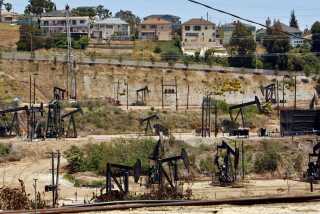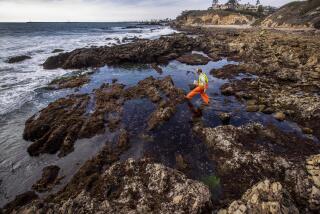BP agrees to pay $18.7-billion settlement in Gulf of Mexico oil spill
Five years after the nation’s worst oil spill scarred fragile shorelines along the Gulf of Mexico and sent economies into a tailspin, the British oil company BP has reached an $18.7-billion settlement designed to close one of the most contentious chapters in environmental history.
The agreement announced Thursday came as U.S. District Judge Carl Barbier in New Orleans was preparing to rule on how much BP would have to pay in penalties for violating the federal Clean Water Act. As part of the ongoing suits, the judge had already ruled that after the Deepwater Horizon oil rig exploded and sank in April 2010, about 134 million gallons of oil spilled into the gulf until the well was capped almost three months later.
The money, to be disbursed on an annual schedule that stretches up to 18 years, would be the largest settlement ever paid by a corporation to resolve environmental claims. If approved by the court, the funds would end claims from the U.S. government, five state governments — Alabama, Florida, Louisiana, Mississippi and Texas — and from more than 400 local governments and agencies.
The money would be in addition to $42 billion the company has said it will pay for immediate and long-term cleanup and to compensate residents and businesses along the gulf. The settlement resolves most, but not all, of the legal fallout from the spill.
“Five years ago we committed to restore the gulf economy and environment, and we have worked ever since to deliver on that promise,” BP Chairman Carl-Henric Svanberg said in a statement. “We have made significant progress, and with this agreement we provide a path to closure for BP and the gulf. It resolves the company’s largest remaining legal exposures, provides clarity on costs and creates certainty of payment for all parties involved.”
State and federal officials praised the settlement for ending the years of litigation and for supplying needed funds.
“We will work diligently during the next several months to incorporate the agreement in principle into a consent decree, which would then undergo public comment before court approval,” U.S. Atty. Gen. Loretta Lynch said in a statement. “If approved by the court, this settlement would be the largest settlement with a single entity in American history; it would help repair the damage done to the gulf economy, fisheries, wetlands and wildlife; and it would bring lasting benefits to the gulf region for generations to come.”
Much of the nation sat transfixed watching underwater images of oil gushing from the Macondo well after the Deepwater Horizon rig exploded and sank. Eleven people died in the disaster, which led to civil and criminal lawsuits focused on BP, the company that leased the rig.
The disaster polluted beaches and fragile wetlands along the gulf, threatened wildlife and severely damaged the local economies, especially those based on fishing and tourism. It also raised questions about the safety of offshore drilling, an issue still being pursued by environmental activists who point to the gulf spill to underscore their fears of drilling off other coasts including Alaska’s.
According to the company, its subsidiary BP Exploration & Production Inc. has agreed to pay a civil penalty of $5.5 billion under the Clean Water Act and $7.1 billion to the U.S. government and the five states for natural resources damage. BP also agreed to pay $4.9 billion to settle economic claims by the states. An additional $1 billion will be paid to the local governments and entities.
Before the latest settlement, BP was already on the hook for $14 billion for response and immediate cleanup costs and $4.5 billion in penalties announced after a November 2012 settlement of a federal criminal case. In 2012, BP reached a settlement with private claimants who were paid at least $10.3 billion for economic and property damage. Thousands of lawsuits are still being contested.
The stock market greeted news of the agreement with joy, pushing BP up more than 5%. Officials across the gulf were also positive.
“This agreement is the result of five years of hard-fought litigation and intense scientific research, and it provides Louisiana the coastal restoration and compensation it needs following the Deepwater Horizon disaster,” Louisiana Atty. Gen. James D. “Buddy” Caldwell said. “This agreement lets us focus right away on improving the state without further litigation delays and appeals that could take years.”
Several environmental groups were more cautious.
“No monetary award can ever undo the destruction of the Deepwater Horizon disaster,” Fred Krupp, president of the Environmental Defense Fund, said in a statement. “But, while we look forward to additional details, today’s agreement, the largest environmental settlement in American history, represents a significant step toward justice for the Gulf Coast ecosystems, economies and communities that were damaged by the disaster. More than five years later, this agreement between the five gulf states, BP and the Department of Justice brings real hope for the future of the Gulf Coast.”
“Today’s settlement still leaves a number of critical issues unresolved,” said Tyson Slocum, director of the consumer advocacy group Public Citizen’s energy program. “While it allows BP to turn the page on fairly favorable financial terms, the settlement leaves unresolved the long-term costs to the gulf ecosystem.
“With a new push to expand offshore drilling in the Arctic and the East Coast, we still lack effective, comprehensive safety and disaster response plans for deep-water drilling. As long as offshore drilling poses such a high risk to the environment and to coastal communities, we should not open new areas to offshore drilling,” he said.
More to Read
Start your day right
Sign up for Essential California for news, features and recommendations from the L.A. Times and beyond in your inbox six days a week.
You may occasionally receive promotional content from the Los Angeles Times.







